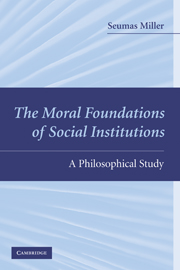9 - The Police
Published online by Cambridge University Press: 05 June 2012
Summary
THE COLLECTIVE END OF POLICING: PROTECTION OF MORAL RIGHTS
In this chapter I apply my individualist, teleological theory of social institutions to police institutions. In addition, I discuss the institutionalization of a practice that is profoundly antithetical to, and corrosive and corruptive of, policing institutions, namely, torture.
I argue that, as with other social institutions, police institutions exist to realize a collective good (Chapter 2). The good in question involves an aggregate of moral rights (including human rights), namely, the moral rights of each and all of the members of some jurisdiction. Moreover, the good in question consists in the protection of this aggregate of moral rights. (Hence the antithetical nature of the practice of torture by police; as a violation of human rights it undercuts the principal institutional purpose of policing, on my account.) Further, rights protection is itself something to which members of the community have a joint right. In short, police officers jointly contribute to the aggregated rights protection of members of the community because the latter have a joint right to such protection.
The central and most important purpose, that is, collective end, of police work is the protection of moral rights, albeit this end, and its pursuit by police, ought to be constrained by the law. While police institutions have other important purposes that might not directly involve the protection of moral rights, such as to enforce traffic laws or to enforce the adjudications of courts in relation to disputes between citizens, or, indeed, themselves to settle disputes between citizens on the streets, or to ensure good order more generally, these turn out to be purposes derived from the more fundamental purpose of protecting moral rights, or they turn out to be (nonderivative) secondary purposes.
- Type
- Chapter
- Information
- The Moral Foundations of Social InstitutionsA Philosophical Study, pp. 245 - 276Publisher: Cambridge University PressPrint publication year: 2009



